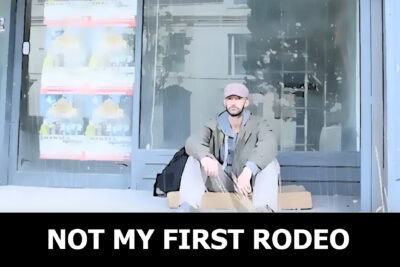Fay (pseudonym) is a woman in her mid-thirties with a history of childhood abuse, neglect, and illicit drug use. She entered adult life with compound trauma from emotional, physical and sexual abuse. This has continued throughout her life, and she has been deemed unable to care for her children who were removed, with no ongoing contact. Fay’s drug use is high, and she was referred to NeuroTriage by her Pathways drug and alcohol worker (now Community Treatment Lead).
It is very hard to conduct an assessment with a person as complex and volatile as Fay; we had to tread carefully, build a therapeutic relationship slowly, and be very sensitive to the subtle shifts in mood that can quickly escalate.
Medical records summary showed as ‘Active’:
| Date | Notes |
| 08-Apr-2023 | Crack cocaine misuse |
| 24-Mar-2023 | Overdose |
| 18-Mar-2023 | Epilepsy |
| 15-Sep-2022 | Mental health disorder |
| 06-Dec-2021 | Schizophrenia |
| 30-Jul-2014 | Emotionally unstable personality disorder |
| 28-Sep-2013 | [X]Psychosis NOS |
| 24-Sep-2013 | Opioid type drug dependence |
| 06-Aug-2013 | Pulmonary embolism |
| 01-May-2013 | Adverse reaction to Quetiapine |
| 08-Sep-2006 | Adverse reaction to Kolanticon |
| 05-Jan-2005 | Asthma |
Whilst being nominally open to psychiatry via the local CMHT, she was sporadic in her appointment attendance (even with high levels of support) and was not in receipt of regular active input, there was no social care involvement, and hostel staff were struggling. An agreement had been made between accommodation providers to move Fay every few months in order to reduce the burnout experienced by staff, when working with Fay. Whilst very vulnerable, Fay was also experienced as highly challenging at times.
Neuropsychological assessment feedback
The following was written and shared with relevant parties (with Fay’s permission) after neuropsychological assessment undertaken by NeuroTriage:
I was asked to assess Fay in my role as Consultant Clinical Psychologist, attached to the Pathways homelessness initiative. I met with Fay on two occasions, and must begin by acknowledging the effort it took Fay to stay with the process of assessment.
Fay is a 35-year-old lady with a long history of trauma, abuse, addiction, mental health struggles, and high levels of anxiety, all of which combine to make it very hard for her to sit with a process of assessment, particularly with a male professional she was not familiar with. I am grateful to Fay and Dawn Davies (drug and alcohol worker) for trusting me to handle the process and information gathered, in a sensitive manner.
I am surprised Fay has not had a neuropsychological assessment before, as she has a number of indicators of potential cognitive deficit; she struggled in school due to poor social support leading to inconsistent attendance, she has been the victim of a number of assaults and potential head injury, in addition to having epilepsy, illnesses (including malignant neuroleptic syndrome in 2013), and the potential toxic damage from prescribed and non-prescribed drug use.
Despite this difficult context, Fay still offers a lot of care to those around her. She spoke warmly of some of the people in her immediate support system, and has a strong desire to regain contact with her children. It was hard for her to have conversations that elicited an emotional response, and she also became anxious about “getting it wrong” when she was undertaking the assessment.
Fay did however manage to complete the Repeatable Battery for the Assessment of Neuropsychological Status (RBANS). The results of which showed significant impairments across all assessed domains of cognitive functioning; visuospatial skills, attention, short and long term memory, language, and general functioning. Of these, Fay’s language skills are perhaps the least impacted, as evidenced by her ability to communicate conversationally. However this relative strength still places her in the significantly impaired range. I have no doubt at all that Fay will be struggling to fully comprehend more complex conversations, and maintain information beyond the most straight forward forms of discussion.
It is my opinion that Fay is likely to require fairly significant levels of support to cope with anything other than fairly routine tasks. She would benefit from accommodation that is able to offer help with more demanding elements of life such as money and tenancy management.
Fay wants contact with her children, and this seems important to her mental health. I don’t know the legal situation, but would hope that this can be explored with Fay. Fay will need support with this, as the emotional and practical elements are difficult for her. Fay requires accommodation that is also trauma-informed, so that the huge emotional and mental health struggles she has can be supported and her fragile self-confidence be nurtured.
I am unsure whether a Care Act Assessment has been completed recently, but I would be happy to support any process to appraise Fay’s ongoing needs, and would be happy to offer further support should that be useful.
Lastly, I spoke to Fay about the potential for accessing therapy. I am aware she hasn’t felt ready for this in the past, but that her complex psychological and mental health struggles would suggest a need for therapeutic support. I would recommend long-term gentle psychological therapy to help her work through some of the past traumas, to nurture her towards her best possible future. Having spoken to Fay about this, she does seem ready to begin the process. It is likely to be a rocky road, with a need for consistency and acceptance so that Fay can develop a trusting therapeutic relationship.
It is very hard to conduct an assessment with a person as complex and volatile as Fay; we had to tread carefully, build a therapeutic relationship slowly, and be very sensitive to the subtle shifts in mood that can quickly escalate. Fay’s ability to self-regulate is low, as her brain has developed through a lifetime of trauma. Her window of distress tolerance is low and her coping mechanisms can often be destructive.
Action plan
We agreed the following actions:
- Provide 1:1 therapeutic input with Fay, whilst establishing an ongoing plan for intervention and support
- Contact CMHT to see if renewed involvement could be possible
- Refer to Adult Social Care for assessment of care and support needs
- Provide staff training focused on trauma and the brain
- Host an MDT
Provide 1:1 therapeutic input with Fay, whilst establishing an ongoing plan for intervention and support
A relatively trusting therapeutic relationship was developed with Fay during the assessment process, built largely on consistency, short sessions, gentle discussions, grounding at the start and end of sessions, and… cupcakes (brought to every session, to bring a smile).
The following is a letter sent to Fay after one of the therapy sessions
Dear Fay,
I hope it is ok to send you a short letter, to say thank you for all the effort you have been putting into our work together. It seems like you are working hard with your team at Andrew House as well, and things are starting to move in a positive direction.
I wanted to remind you of what you said last week, so that you can see how powerful your words are, and how clear it is that you want to keep moving forward. You said:
“I had a messed up wriggly spaghetti knot in my head that we had to unravel slowly bit by bit coz this is me stepping towards independence. I am getting help to let me be myself. I was getting moved between every hostel. Nicky argued my case for me to stay here. The person that came here was self-destructive. Now I am moving on with my life, but I have to learn to avoid triggers, and instead be myself.”
Fay this shows how much you are working towards the future you want. I hope we can help you along the way.
Looking forward to seeing you on Tuesday at 4.30pm when we can begin helping you write your story.
This process of therapeutic engagement also helped in developing a formulation with Fay, that could be shared with others who work with her:
CMHT involvement
It took some time to re-engage CMHT, but a psychologist was eventually assigned. A number of liaison sessions were held between NeuroTriage and the CMHT to establish an agreement whereby the psychologist would continue therapeutic work with Fay, following a similar format to that begun by NeuroTriage. They agreed to attend an MDT, and consider whether there were any unmet psychiatric needs.
Social Services involvement
Again, a lot of liaison was required with social care. A referral was made to Careline and had to be followed up on a number of occasions, having seemingly been lost in the system. When a social worker was allocated, further liaison was undertaken, but it has taken almost five months, and Fay is yet to be seen. One appointment was made recently, but it was a morning one, and Fay could not participate. We now have a new appointment scheduled, for an afternoon, with NeuroTriage to support, which has been agreed to after further repeated requests being made.
Provide staff training on trauma and the brain
All hostel staff have now been training by NeuroTriage on the topic of Trauma and the brain. The following are examples of the content of the training:
A brain that has developed in a healthy environment has most of the developmental period focussed on developing emotional regulation, and complex cognitive skills. A brain that has grown through trauma spends the majority of its development building areas to survive, leaving less time to develop the cognitive skills required to live an independent adult life. Whilst some level of stress can enhance coping mechanisms, prolonged and / or repeated traumas result in a brain that is fearful, reactive, and unable to self-soothe.
The challenge for people who support adults who have had these experiences is to help support individuals through developing safe and secure attachments, before then helping to guide towards regulation, with the expectation that ‘competence’ can only be a long-term goal, and may never come with someone whose brain has had a lifetime of being shaped by trauma.
Host an MDT
An MDT was held, with attendees from Pathways, accommodation, and CMHT, with the following actions agreed:
- CMHT psychologist to take Fay’s case to the CMHT MDT with a request to:
- Review Fay’s psychiatric diagnoses. She has quite a number listed, and we need to see which are accurate and which need removing / adjusting
- Once the diagnoses have been reviewed can medication also be checked to ensure this is appropriate
- Accommodation staff to support Fay to attend psychiatry meeting on 30th August, and check on point 1. above
- NeuroTriage and CMHT psychologist to liaise to support CMHT psychologist to meet Fay, and begin the transition to Matt taking over as psychologist
- CMHT psychologist’s role will be 1:1 with Fay plus staff support
- Even if 1:1 work doesn’t come to fruition, staff support will still be provided by CMHT psychologist.
- Sessions will take place at accommodation. They will be shorter sessions, and Fay will be accompanied by a member of accommodation staff
- NeuroTriage to contact accommodation providers to ensure Fay’s tenancy at Andrew House can be assured for the foreseeable future, whilst we continue with these positive gains
Recent Updates
Fay experienced a number of assaults, which have been reported to the police. NeuroTriage, Pathways, and the accommodation providers continue to support Fay through this process. Pathways have recently employed new staff as coaches, which has been a huge help to Fay, in finding ways to healthily manage day to day activities, life skills, and coping mechanisms. This is likely to be vital for the foreseeable future, in order to bridge the gaps between what Fay needs, and what accommodation providers can offer.
Fay herself has taken a significant dip, which may be linked to drug use, the attacks she alleges have occurred, and / or patterns of mental health cycles. She cancelled four consecutive appointments with NeuroTriage. Rather than this leading to discharge, we kept on ensuring Fay knew she was kept in mind; cupcakes were delivered at the scheduled appointment times, and left in the accommodation office for staff to pass to Fay, a letter was written to her, and appointments were continued to be offered. This eventually proved successful, and Fay has now attended the last two appointments, and begun writing her personal story, which she’d like documenting. The CMHT psychologist has remained connected, and has agreed to work with staff, whilst Fay is finding her feet again. Fay is being supported with health and police liaison, and an assigned social worker is to visit jointly with NeuroTriage within the next two weeks.




